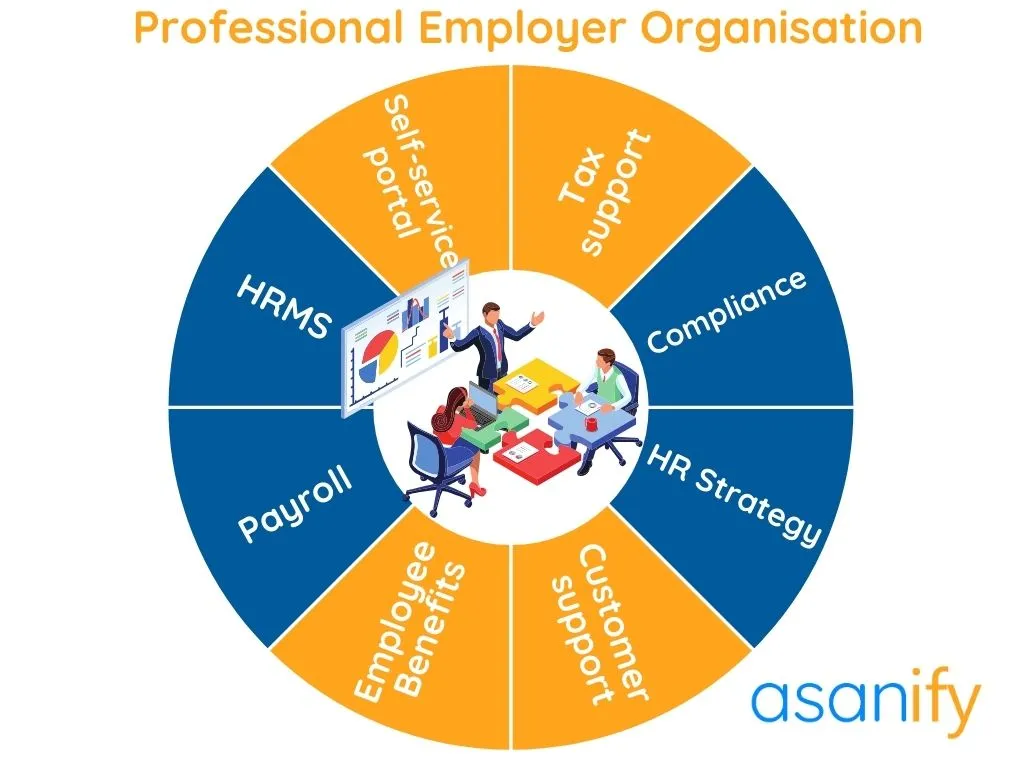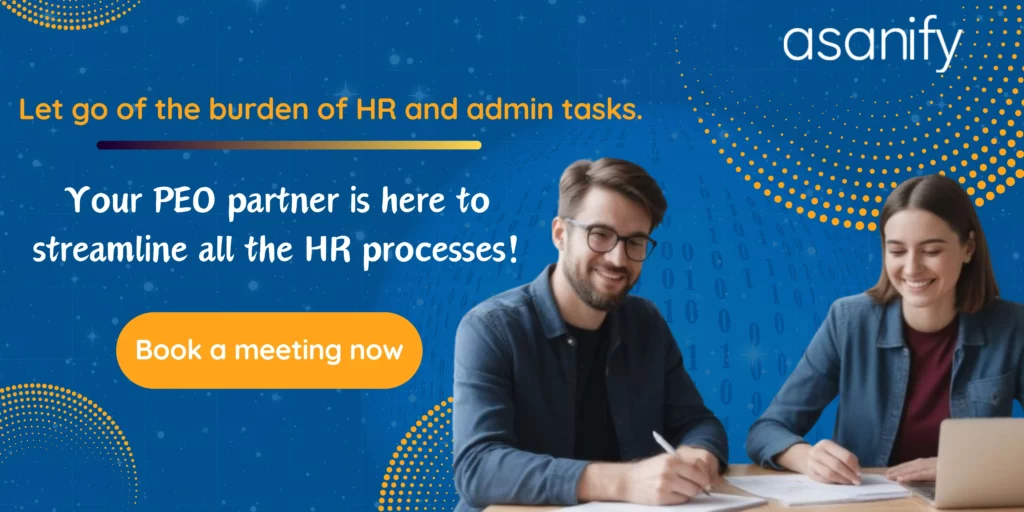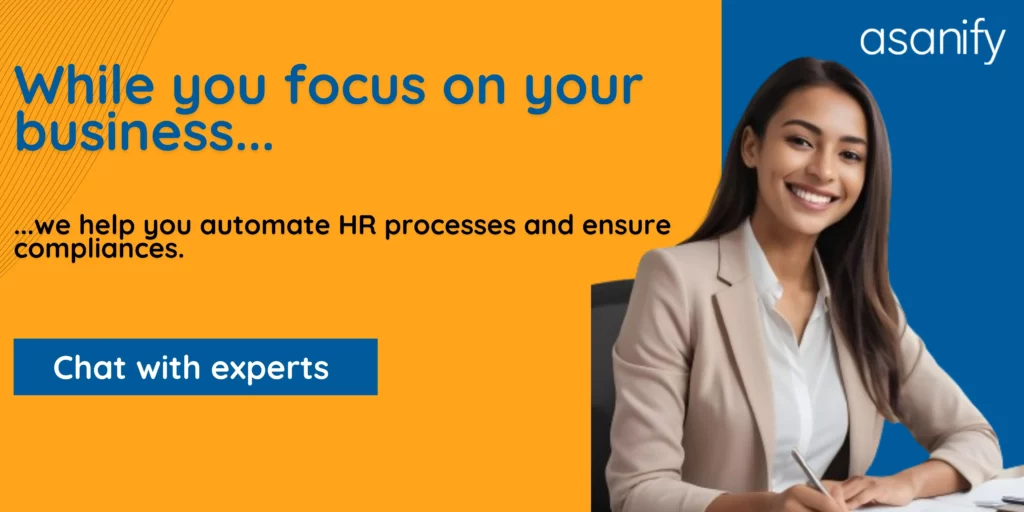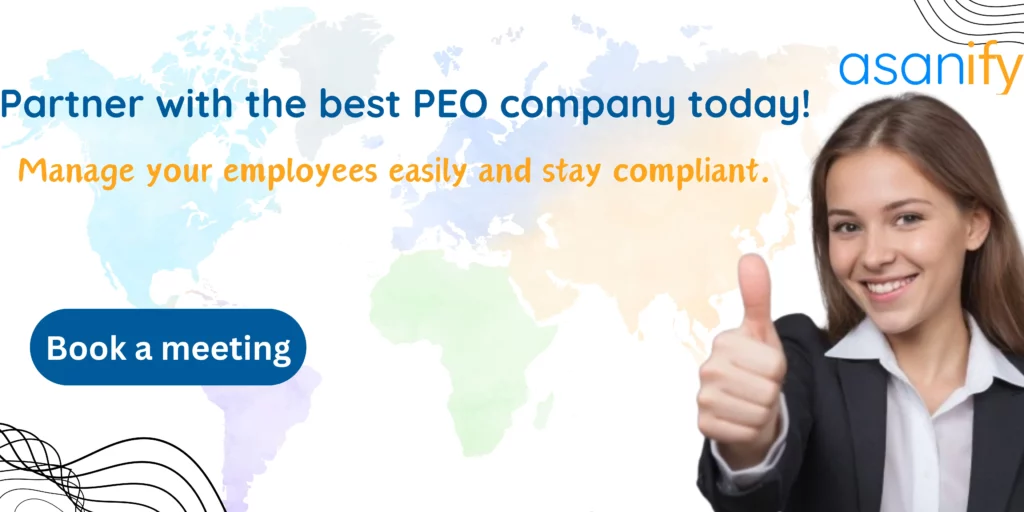Are you struggling with managing HR processes and people management tasks in your organisation? If yes, you have come to the right place. As a business owner, monitoring compliances, running payroll and managing your employees may appear to be quite overwhelming. On top of that, arranging an attractive employee benefits package for your workforce may appear to be a sheer impossibility. And, that’s the very reason for which you need to have a detailed understanding of what is a PEO. Professional Employer Organisations or PEOs aid businesses in managing all the HR processes, ranging from payroll processing, benefits administration to compliance & tax support. Let’s see what is a PEO in great detail and how can it help your business to a great extent.
Table of Contents
- What is a PEO and What Does it Stand for in HR?
- Why Use a PEO? Top 8 Ways It Can Help Your Business
- PEO for Small Business
- Are There Different Types of PEOs?
- How Does a PEO Work?
- What a PEO Doesn’t Cover
- Differences Between PEO & Other Services
- How to Choose a PEO?
- What Kind of Businesses Benefit From PEOs?
- What do PEOs Cost?
- What is a Certified PEO?
- Pros and Cons of a PEO
- Frequently Asked Questions (FAQs)- PEO
What is a PEO and What Does It Stand For in HR?
PEO stands for Professional Employer Organisation. It refers to a kind of HR outsourcing services by using which business owners can streamline the HR processes in their organisation. By entering into a co-employment arrangement, PEOs aid companies in carrying out several crucial tasks such as payroll processing, employee benefits administration, ensuring compliances and so on. PEOs take care of employee management activities on behalf of the company and helps businesses in saving time and resources.
Through the co-employment relationship, PEOs share certain employer responsibilities and liabilities with client companies. While the client company retains control over day-to-day operations, the PEO manages HR functions and assumes legal responsibilities related to employment, payroll, and benefits administration. In no way does a PEO interfere with the internal decision-making activities of a business. Its core role lies in helping businesses manage their HR functions effectively, ensuring compliance, reducing costs, and enhancing the overall employee experience.
Suggested Read: EOR vs PEO Differences: All That You Need to Know
Why Use a PEO? Top 8 Ways It Can Help Your Business
You might be skeptical of this entire thing about partnering with a PEO company and letting it take care of certain aspects of your business. Still, there are several companies all over the world that are using PEOs on a large scale. Wondering why? Well, let’s find out why PEOs are used!
Using a PEO enables companies to conduct business operations swiftly and stay compliant. This is because all the complex regulatory norms are taken care of by a PEO. Further, all the HR and administrative tasks are managed by the PEO partner, thereby letting businesses save significant amounts of time and cost. This gives business owners and employers a great peace of mind to focus on the core aspects of their business.
Businesses rely on PEOs owing to the following reasons:
1. Access to Expertise
PEOs specialize in HR management, providing businesses with access to expert HR professionals who can handle complex HR tasks, navigate regulatory requirements, and offer strategic guidance on HR issues. Studies have revealed that companies using a PEO have 40% better revenue growth. No wonder why partnering with a PEO service provider is a prudent decision in the current business landscape.
2. Cost Savings
Outsourcing HR functions to a PEO can result in cost savings for businesses by reducing overhead costs associated with maintaining an in-house HR department. PEOs such as Asanify leverages economies of scale to negotiate competitive rates for employee benefits, insurance, and other HR services.
3. Compliance Assistance
Taking care of diverse compliances and tax norms can be quite daunting. PEOs help ensure compliance with ever-changing employment laws, regulations, and tax requirements. They stay up-to-date with legal developments, handle payroll tax filings, provide assistance with regulatory reporting, and mitigate compliance risks for client companies.
4. Risk Mitigation
PEOs assume certain employer responsibilities and liabilities, such as workers’ compensation, unemployment insurance, and employment practices liability insurance (EPLI). By sharing these risks with the PEO, businesses can reduce their exposure to legal and financial liabilities.
5. Streamlined HR Processes
As per research findings, PEO clients succeeded in having 35% savings on HR administration. By providing smart technology solutions, automating administrative tasks, and offering self-service portals for employees, PEOs aid businesses in streamlining all the HR processes. This improves efficiency, reduces administrative burden, and allows businesses to focus on core activities.
6. Access to Employee Benefits
PEOs offer access to a wide range of employee benefits, including health insurance, retirement plans, and other perks. By pooling client companies together, PEOs can negotiate competitive rates and offer robust benefits packages that may not be available to smaller businesses on their own.
7. Scalability and Flexibility
More than 15% of employers with 10-99 employees collaborate with a PEO. Professional Employer Organisations provide scalable HR solutions that can adapt to businesses’ changing needs, whether they are scaling up, downsizing, or expanding into new markets. Further, they offer flexibility in service offerings, allowing businesses to customize services based on their requirements.
8. Enhanced Employee Experience
PEOs help improve the employee experience by offering competitive benefits, professional development opportunities, and HR support services. This fosters employee satisfaction, engagement, and retention, leading to a more productive and motivated workforce.
Suggested Read: PEO Service Providers in India
PEO for Small Business
Over the last 15 years, employment at SMBs that use PEOs has risen between 7% and 9% faster as compared to small and midsize enterprises, reveals a study.
As per a study by NAPEO, PEOs serve 173,000 small and medium-sized companies that employ about 4 million people. PEOs can be a great choice for small and medium-sized businesses (SMBs). Wondering why? Well, by outsourcing their strategic HR functions to a PEO partner, startups and SMBs will be able to focus on the core activities of their business. This is because they won’t have to deal with the complex HR activities, payroll processing, tax calculation, statutory compliances, etc. themselves. The PEO partner will do it all on the behalf of the company.
Here’s why PEOs can prove to be of great value for small businesses:
1. Cost-Effective HR Solutions
Small businesses often lack the resources to maintain an in-house HR department. PEOs provide cost-effective HR solutions by bundling services and leveraging economies of scale.
2. Support of a Team of HR Experts
PEOs offer access to HR professionals who specialize in various areas such as payroll, benefits administration, and compliance. This expertise ensures small businesses remain compliant with complex employment laws and regulations.
3. Provision of Attractive Employee Benefits Package
PEOs allow small businesses to offer competitive employee benefits packages, including health insurance, retirement plans, and other perks. By pooling employees from multiple clients, PEOs can negotiate better rates and options.
4. Focus on Core Operations
By outsourcing HR functions to a PEO, small businesses can focus on their core operations and strategic initiatives without getting bogged down by administrative tasks.
5. Scalability
PEOs offer scalable HR solutions that can adapt to the changing needs of small businesses, whether they are growing rapidly or need to downsize. This flexibility ensures that HR services can grow alongside the business.
Suggested Read: EOR Companies in India- Top 15 Companies
Are There Different Types of PEOs?
Though there is only a single type of PEO or co-employment model available, misconceptions among employers and business owners are rife. Often, employee leasing is wrongly used to define PEOs and things get more confusing than ever. PEOs are also not synonymous with staffing services. This is because PEOs are not responsible for sourcing workers for companies during employee absence or need of talent for temporary/short-term projects.
PEO is only of one type that deals with HR outsourcing. Further, PEO service providers aid businesses to operate in a new country smoothly by taking over all the HR and administrative tasks. To put it down in simple words, PEO offers a wide range of HR outsourcing services and personalized guidance to business owners to stay compliant.
PEOs & Other Kinds of Outsourcing
PEO follows a distinct co-employment arrangement. Other different kinds of outsourcing models that are mistaken for PEOs include:
- Staff or employee leasing company
- Human Resources Outsourcing Organization or HRO
- Administrative Services Organization or ASO
- Payroll Outsourcing
How Does a PEO Work?
PEOs work on the foundation of a co-employment relationship. So, both the business and the PEO have their own set of obligations. Let’s understand the way a PEO works sequentially:
1. Engagement & Onboarding
A client company enters into a contractual agreement with a PEO, outlining the scope of services and terms of the partnership. During the onboarding process, the client provides necessary information about their company, employees, and HR needs to the PEO.
2. Co-employment Relationship
Upon agreement, the PEO becomes a co-employer of the client company’s employees for tax and insurance purposes. This establishes a legal relationship where the PEO assumes certain employer responsibilities, while the client company retains control over day-to-day operations.
3. HR Management & Administration
The PEO takes over administrative tasks related to HR management, such as payroll processing, benefits administration, tax withholding, and regulatory compliance. This includes tasks like employee onboarding, timekeeping, benefits enrollment, and processing payroll checks.
4. Employee Benefits Provision
As one of the services offered by a PEO partner, access to employee benefits such as health insurance, retirement plans, and other perks is a significant one. The PEO typically pools together employees from multiple client companies to negotiate competitive rates and offer comprehensive benefits packages.
5. Compliance Support
Gaining a deeper understanding of the varied compliance norms prevailing in a country can be daunting. The PEO helps ensure compliance with employment laws, regulations, and tax requirements. This includes handling payroll tax filings, providing assistance with regulatory reporting, conducting HR audits, and implementing best practices to mitigate compliance risks.
6. Managing Risks
The PEO assumes certain employer liabilities, such as workers’ compensation, unemployment insurance, and employment practices liability insurance (EPLI). By sharing these risks with the PEO, the client company can reduce its exposure to legal and financial liabilities.
7. Reporting & Analytics
Once a company partners with a PEO firm, the former receives reporting tools and analytics to track HR metrics, monitor employee performance, and make data-driven decisions. This allows client companies to gain insights into their workforce and identify areas for improvement.
8. Constant Support & Ongoing Partnership
The PEO maintains an ongoing partnership with the client company, offering support, guidance, and resources as needed. Professional Employer Organisation firms such as Asanify is intensively responsive to client needs, adapting services and solutions to accommodate changes in business requirements or regulations. In fact, the customer support team operates round the clock to ensure that any problem received by client companies gets resolved instantaneously.
Suggested Read: Types of Employment Contracts

What a PEO Doesn’t Cover?
While PEOs take care of all the HR and administrative processes of an organisation, there are certain things that it can’t do. A PEO company aids businesses in automating HR processes and offering services such as compliance and tax support and other people management tasks. Outsourcing HR services to a PEO firm doesn’t mean that you are letting them take over the complete control of your organisation.
Unlike employee leasing or staffing companies that supply workers to companies either on a temporary or project-basis, a PEO works in a different way. A PEO doesn’t undertake tasks such as recruiting employees for client companies at the time of talent shortage or employee absence.
PEOs offer HR services and benefits to the client company. It doesn’t supply workforce to companies. Further, a PEO service provider will not meddle in the sovereignty of companies. Neither will a PEO aid businesses in marketing, sales and product distribution. In fact, a PEO company won’t govern pay rates and work schedules of the workers of an organisation.
In short, PEOs won’t do the following:
- Control your business or employees
- Replace your internal HR team
- Supply workers to your organisation when required
Differences Between PEO & Other Services
A PEO, or Professional Employer Organization, is a company that provides comprehensive HR outsourcing services to businesses. There are certain other similar services made available to businesses so that the heavy load of administrative and HR work can be lifted. Therefore, while assessing your needs and getting acquainted with the basics of PEO, it is crucial to stay aware of the core differences that exist between a PEO and other related services.
Let’s see what these are:
PEO Vs HR Software
|
PEO |
HR Software |
| Acts as the employer of record for tax and insurance purposes | Provides only a platform powered by smart HR technologies for managing HR processes |
| Provides comprehensive HR outsourcing services, including payroll processing, benefits administration, compliance management, and HR support | Offers features such as employee self-service portals, applicant tracking, performance management, time and attendance tracking, and HR analytics |
| Assumes responsibility for employment-related liabilities, such as workers’ compensation and unemployment insurance | Facilitates automation and streamlining of HR tasks, reducing administrative burden and improving efficiency |
| Offers personalized HR guidance and support from HR professionals | Does not assume the role of a co-employer |
| Typically involves a co-employment relationship between the PEO, the client company, and its employees. | Requires the client company to retain legal responsibility for employment-related matters, including compliance and liability management. |
PEO Vs Payroll Company
|
PEO |
Payroll Company |
| Provides a diverse range of services, starting from payroll processing, benefits administration, compliance management, to personalized HR support. | Focuses primarily on automating payroll run while calculating and disbursing employee wages, taxes, and deductions accurately and on time. |
| Offers additional HR services beyond payroll, such as employee benefits administration, HR compliance, and risk management. | May offer other services such as time and attendance tracking, tax filing, and direct deposit, but these are usually related to payroll functions. |
| Assumes complete responsibility of processing payroll while taking care of taxes and employee salary deductions | While a payroll company automates payroll and assists businesses in calculating taxes, the entire responsibility lies solely on the business for fulfilling its payroll obligations |
How to Choose a PEO?
Here are some tips that will help you choose the best Professional Employer Organisation for your business:
- Determine your specific HR requirements, including payroll, benefits, compliance, and HR support.
- Look for reputable PEOs with experience in your industry and positive client reviews.
- Ensure the PEO has knowledge of local employment laws and regulations relevant to your business.
- Confirm whether the PEO offers the services you need along with the required flexibility to scale as your business grows.
- Get feedback from existing clients to validate the provider’s reputation and reliability.
- Ensure the PEO’s technology platform is user-friendly, secure, and compatible with your systems.
- Review the pricing structure to ensure it aligns with your budget and the value of services provided.
- Choose a partner that aligns with your company values and communication style.
- Ask for proposals from shortlisted PEOs and compare service details, pricing, and terms.
- Negotiate terms to ensure the PEO service providers meet your specific needs and budget requirements.
Suggested Read: Appraisal Format for Employees- Cool Tips to Write the Best Employee Appraisal Letter
What Kinds of Businesses Benefit From PEOs?
While small and medium-sized businesses (SMBs) benefit a lot from co-employment model, larger organizations and enterprises get to witness impressive results after employing a PEO partner. Companies operating in a diverse range of industries have significantly benefited from PEO services. These include, but not restricted to:
- Legal Services
- Business Services
- Non-profits
- Hospitality
- Travel arrangements
- Real estate
- IT services
- Accounting and bookkeeping
- Manufacturing
- Insurance
- Engineering services
- Financial services
- Securities brokers & dealers
- Wholesale
- Health services
- Management & consulting
- Plumbing, HVAC and other businesses
PEO service providers such as Asanify offers excellent HR and payroll services at highly affordable rates. With Asanify, your business stays insulated from risks of violations of law. Further, you get to save a lot of time that you can invest in strategising growth for your business.
What do PEOs Cost?
The cost of partnering with a Professional Employer Organization (PEO) can vary depending on several factors, including the size of the client company, the scope of services required, the level of customization, and the PEO’s fee structure. Here are some factors that can influence the cost of a PEO:
1. Employee Count
Many PEOs charge a per-employee, per-month (PEPM) fee based on the number of employees covered under the PEO arrangement. The larger the workforce, the higher the total cost. However, some other PEOs may even charge on the basis of a certain percentage of payroll.
2. Scope of Services
The cost of a PEO can also depend on the range of services provided. Basic services such as payroll processing and benefits administration may have lower fees, while additional services such as HR consulting, compliance management, and risk mitigation may incur additional costs.
3. Employee Benefits
PEOs often provide access to employee benefits such as health insurance, retirement plans, and other perks. The cost of these benefits can vary depending on factors such as plan options, coverage levels, and employee demographics.
4. Customization
Some PEOs offer customizable service packages tailored to the specific needs of the client company. Customization may involve additional fees or a higher base rate to accommodate unique requirements.
5. Administrative Fees
PEOs may charge administrative fees for setup, onboarding, and ongoing support services. These fees can vary depending on the complexity of the implementation process and the level of support provided.
6. Insurance Premiums
PEOs often bring client companies together to leverage group purchasing power and negotiate lower insurance premiums for workers’ compensation, general liability, and other insurance coverage. The cost of insurance premiums may be included in the overall PEO fee or billed separately.
7. Additional Charges
Some PEOs may assess additional charges for services such as employee training, background checks, drug testing, or other ancillary services not included in the standard service package.
Suggested Read: Employer of Record India Cost- All That You Need to Know
What is a Certified PEO?
A Certified PEO (Professional Employer Organization) is a designation given to PEOs that have undergone a rigorous accreditation process to demonstrate their adherence to industry standards and best practices. Certification is typically awarded by accrediting bodies or industry associations that set criteria for PEOs to meet in areas such as financial stability, ethical business practices, compliance with regulatory requirements, and quality of service delivery.
The certification process may involve comprehensive audits, financial reviews, and assessments of operational procedures to ensure that the PEO meets or exceeds established standards. Once certified, the PEO may display the certification seal as a mark of credibility and quality assurance.
Certification as a PEO provides reassurance to client companies and their employees that the PEO has met stringent requirements and is committed to upholding high standards of professionalism, integrity, and service excellence. It can also serve as a valuable differentiator in a competitive marketplace, helping certified PEOs stand out and attract clients seeking reputable and trustworthy HR outsourcing partners.
The best thing about CPEOs is that client companies can benefit a lot because of extra financial protections and tax benefits made available to them. For example, partnering with a CPEO implies that it is authorized to pay federal taxes on your behalf. So, you won’t have to face double taxation. This won’t have been the case if you had partnered with a non-certified PEO. However, it is to be noted there is only a handful of PEO companies that are certified by the IRS.
What Does Working With a CPEO Help Ensure?
Working with a Certified Professional Employer Organization (CPEO) helps ensure several key benefits for businesses:
1. Financial Security
The IRS Certification Program requires CPEOs to have a surety bond each year and this guarantees payment of the federal employment tax liabilities.
2. Elimination of Tax “Restart”
Having a certification removes the norm of wage-base “restart” for some federal payroll taxes if you embark upon or leave a CPEO relationship in the middle of a year.
3. Credibility
Since PEO service providers need to undergo the assessment rounds to obtain the certification periodically, they will ensure consistency in their performance. Therefore, with a transparent Professional Employer Organisation, you get the assurance that it is a reliable partner with whom you can entrust crucial details pertaining to HR and payroll.
What is ESAC-accredited PEOs?
Apart from the IRS, the Employer Services Assurance Corporation or ESAC offers certifications to PEOs. ESAC accreditation is offered only to those PEO firms that have displayed great financial stability, ethical standards in conducting business operations and strong adherence to regulatory norms.
Pros and Cons of a PEO
A PEO comes with its own fair share of advantages and drawbacks. However, choosing a good PEO partner after a lot of analysis and scrutiny will help you keep the drawbacks at bay. In addition to the benefits that a PEO brings to the table, it is crucial to stay aware of its limitations so that you don’t
Pros
- A-to-Z of HR Services: Access to a wide range of HR services, including payroll processing, benefits administration, compliance management, and HR support.
- Cost Savings: Reduced overhead costs associated with maintaining an in-house HR department.
- Expertise & Compliance: Expertise in navigating complex employment laws, regulations, and tax requirements, ensuring compliance and reducing legal risks.
- Seamless Collaboration: Ensures a swift and smooth collaboration between the HR expert assigned to you by the PEO and your internal HR team, thereby helping you stay compliant.
- Risk Management: Assumption of certain employer responsibilities and liabilities, such as workers’ compensation and employment practices liability insurance (EPLI), reducing risk exposure for businesses.
- Access to Employee Benefits: Assumption of certain employer responsibilities and liabilities, such as workers’ compensation and employment practices liability insurance (EPLI), reducing risk exposure for businesses.
Cons
- Dependency on vendor: Reliance on the PEO for HR services, with any disruptions or issues potentially impacting business operations.
- Misalignment: Potential misalignment with the culture, values, and priorities of client companies.
- Confidentiality Concerns: Sharing sensitive employee information with a third-party PEO may raise concerns about confidentiality and data security. That is why, it is crucial to choose PEO companies such as Asanify that offers high security standards and ensures protection of sensitive data.
Frequently Asked Questions (FAQs)- Professional Employer Organisation
1. What does PEO mean?
PEO stands for Professional Employer Organization. It’s a company that provides comprehensive HR outsourcing services to client businesses, including payroll processing, benefits administration, compliance management, and HR support.
2. What is PEO known for?
3. What is PEO in India?
In India, PEO stands for Professional Employer Organization. It’s a company that offers HR outsourcing services to businesses, such as payroll processing, benefits administration, compliance management, and HR support. These organizations help businesses streamline their HR functions and ensure compliance with local employment laws and regulations.
4. What is the duty of a PEO?
The primary duty of a PEO (Professional Employer Organization) is to provide comprehensive HR outsourcing services to client businesses. This includes tasks such as payroll processing, benefits administration, compliance management, risk mitigation, and HR support. PEOs help businesses streamline their HR functions, ensure compliance with employment laws, and manage employer responsibilities and liabilities.
5. Is PEO legal in India?
Yes, Professional Employer Organizations (PEOs) are legal in India. They operate within the framework of Indian labor laws and regulations, providing HR outsourcing services to businesses.
6. What is a BPO?
A BPO, or Business Process Outsourcing, is a company that provides various business services to client organizations, typically handling non-core functions such as customer service, technical support, data entry, and back-office operations.
7. What is the difference between HCM and PEO?
HCM (Human Capital Management) and PEO (Professional Employer Organization) are both related to HR functions but serve different purposes:
a. HCM: Human Capital Management refers to the strategic approach to managing an organization’s workforce. It encompasses processes such as recruitment, talent management, performance management, and employee development. HCM focuses on maximizing the value of human capital within an organization.
b. PEO: Professional Employer Organization, on the other hand, is a company that provides HR outsourcing services to client businesses. PEOs handle tasks such as payroll processing, benefits administration, compliance management, and HR support. PEOs often enter into co-employment relationships with client companies, sharing certain employer responsibilities and liabilities.
8. How many businesses use a PEO?
In the United States, thousands of businesses, ranging from small and medium-sized enterprises (SMEs) to large corporations, use Professional Employer Organizations (PEOs) to outsource their HR functions. While specific numbers may vary, estimates suggest that over 200,000 businesses rely on PEOs to manage their HR needs effectively. This number has been steadily growing as more businesses recognize the benefits of outsourcing HR services to PEOs.
9. How do PEOs make money?
PEOs typically make money by charging client companies a fee for the HR outsourcing services they provide. This fee structure can vary but often includes a combination of setup fees, monthly service fees based on the number of employees, and additional charges for extra services or customized solutions. Additionally, PEOs may generate revenue through commissions or fees from insurance providers or other vendors for offering employee benefits and ancillary services.
10. What is the structure of a PEO?
The structure of a Professional Employer Organization (PEO) typically involves the following key components:
a. Client Companies: These are businesses that contract with the PEO to outsource their HR functions. Client companies retain control over their day-to-day operations, including hiring, supervision, and termination of employees.
b. PEO Provider: The PEO is the entity that provides HR outsourcing services to client companies. It manages tasks such as payroll processing, benefits administration, compliance management, and HR support.
c. Co-Employment Relationship: Through a co-employment relationship, the PEO becomes a co-employer of the client company’s employees for tax and insurance purposes. This arrangement allows the PEO to assume certain employer responsibilities and liabilities.
d. Employees: These are the workers employed by the client companies. While the PEO becomes the “employer of record” for tax and insurance purposes, employees typically report to and are managed by the client company.
Not to be considered as tax, legal, financial or HR advice. Regulations change over time so please consult a lawyer, accountant or Labour Law expert for specific guidance.









![Read more about the article [Section 80JJAA] How to get Tax Deduction for Employment Generation](https://media.asanify.com/wp-content/uploads/2021/02/18173833/priscilla-du-preez-XkKCui44iM0-unsplash-300x200.jpg)